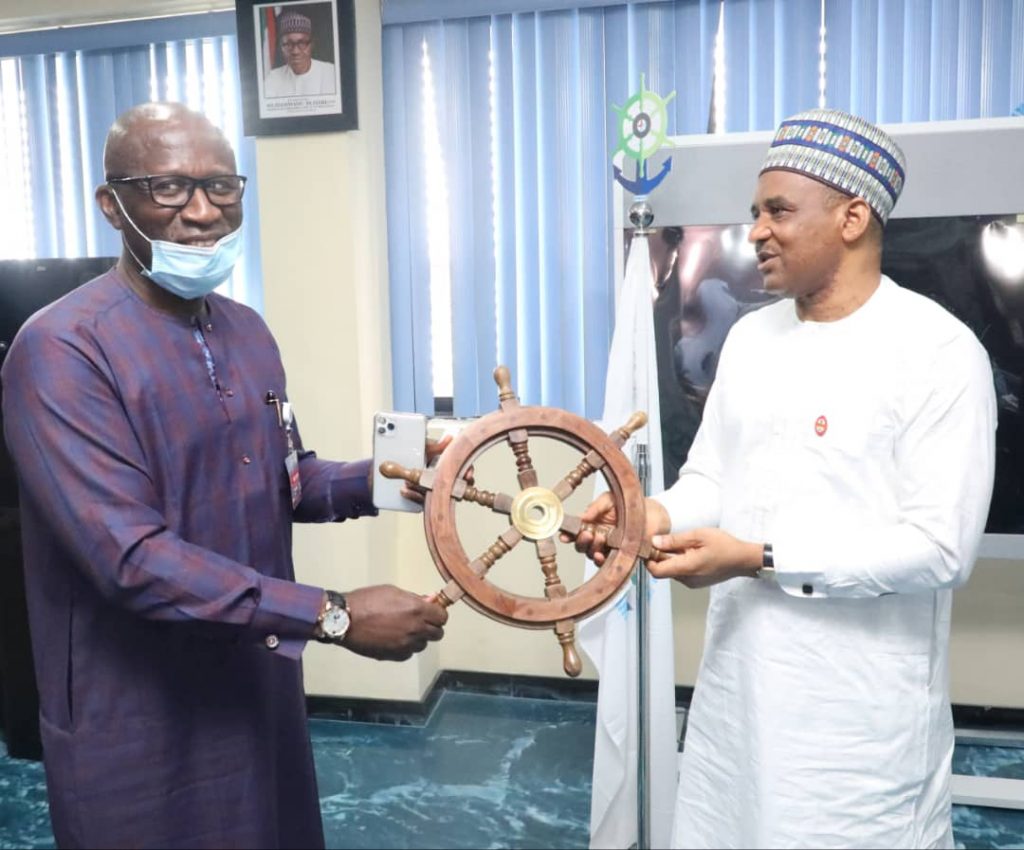
…Seeks New Maritime Security Strategy
The Nigerian Maritime Administration and Safety Agency (NIMASA) has revived efforts to change the Terms of Trade for the affreightment of Nigerian crude oil from Free on Board (FOB) to Cost Insurance and Freight (CIF).
Director-General of NIMASA, Dr. Bashir Jamoh, disclosed this in Lagos, when he received a delegation from the Nigerian National Petroleum Corporation (NNPC) led by the newly appointed Group General Manager, Crude Oil Marketing Division, NNPC, Sir Billy Okoye.
Jamoh, who had recently paid a similar working visit to the Group Managing Director of NNPC, Mele Kyari, at the corporation’s headquarters in Abuja, expressed NIMASA’s appreciation of NNPC for accommodating the Agency’s interests in transactions where the maritime regulator relied on data from the national oil company.
The NIMASA DG also revealed that the Agency was working towards the implementation of a National Maritime Security Strategy to improve security in Nigerian waters and reduce the cost of shipping.
“Since 2018, NIMASA has championed moves for a change in the terms of trade with regard to transportation of Nigerian crude oil, from FOB to CIF to ensure greater benefits for the country from its oil resources,” the Director-General stated. “A technical committee involving NIMASA, NNPC, and other stakeholders would be set up to develop a template for the desired change, with workable timelines,” he added.
Under FOB trade terms, Nigeria has no reasonable control over the delivery of its crude oil as regards carriage, insurance, and other ancillary services. But under the CIF arrangement, the country maintains ample control over the distribution of its oil, which can be leveraged to enhance the competitive advantage of indigenous operators.
Jamoh commended the synergy between NNPC and NIMASA, saying, “Seventy per cent of the Agency’s revenue comes through the sale of crude. Thus, cooperation between NNPC and NNPC cannot be over-emphasised.”
The NIMASA Director-General also disclosed, “The Maritime Intelligence Unit recently established by the Agency is part of efforts to ensure a proactive approach to security in our waters. The focus is to try to nip maritime attacks in the bud by tracking the criminals from the pre-planning and planning stages.
“The ultimate aim is to develop a National Maritime Security Strategy that would help to minimise the cost of insecurity, which NNPC bears on behalf of the country, in the shipment of Nigerian crude.”
The DG recalled NNPC’s grant of the Agency’s requests and generous pledge of cooperation during his recent visit to the corporation and prayed for the continuation of such mutual understanding.
He stated, “We appreciate the NNPC for accommodating NIMASA in its processes. We do not delay vessels in the search for information on them because of the confidence we have in NNPC’s capacity to readily supply such information.”
The Director-General appealed for more local content in the transportation of the country’s crude in line with the Cabotage regime.
While addressing the meeting earlier, Okoye declared that NIMASA was a “critical stakeholder in the business of crude oil sale.” He said his goal was to get the two agencies of government interfacing more closely with each other to resolve challenges and ensure seamless movement of crude and petroleum products in the country.




TG中文版下载是您了解这款跨平台消息应用的门户。探索其特性、下载最新版本,并加入全球Telegram社区。
纸飞机 群组功能强大,可容纳大量成员,适合社群交流和信息分享。